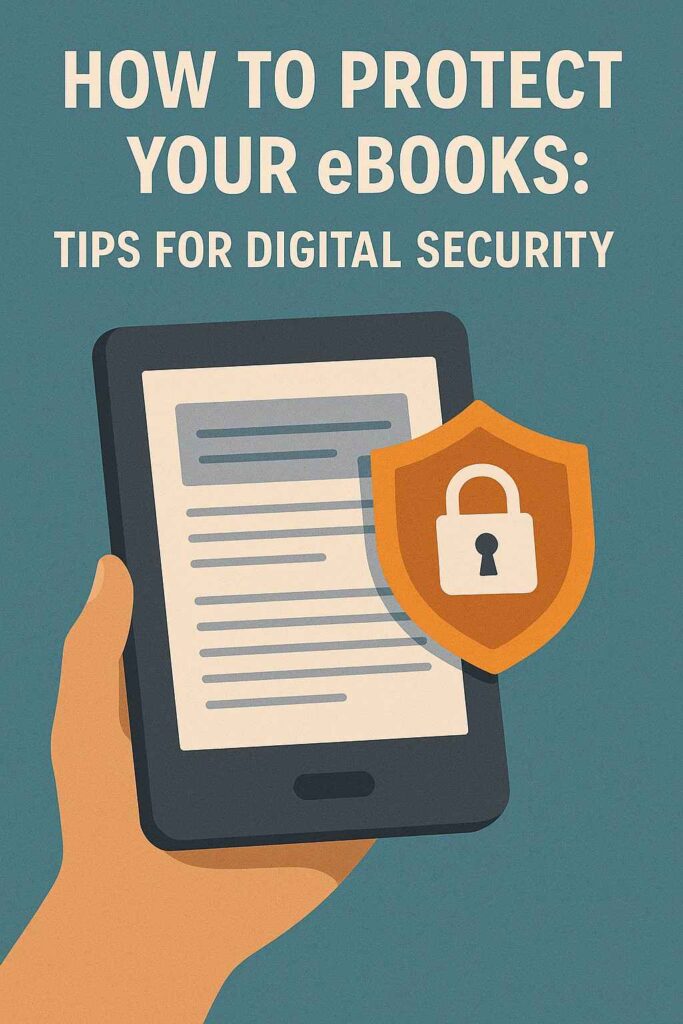Your eBook collection is a treasure trove of stories, knowledge, and inspiration—but have you thought about keeping it safe? In 2025, with digital reading more popular than ever, securing your eBooks is just as important as locking your front door. From accidental data loss to sneaky hackers, there are risks to your digital library. But don’t worry! With a few simple steps, you can protect your eBooks and read with peace of mind. Let’s dive into five practical tips to ensure your digital books stay safe and sound.

1. Use Strong Passwords and Two-Factor Authentication
Your eBook accounts—whether on an eReader, app, or online platform—are gateways to your library. A weak password is like leaving your books on a park bench. Here’s how to lock them down:
-
Create Strong Passwords: Use a mix of letters, numbers, and symbols (e.g., “R3adB00k$2025!”). Avoid obvious choices like “password123” or your birthday.
-
Use a Password Manager: Tools like LastPass or 1Password can generate and store complex passwords securely.
-
Enable Two-Factor Authentication (2FA): Many eBook platforms support 2FA, requiring a second step (like a code sent to your phone) to log in. Check your account settings and turn it on.
Pro Tip: Update your passwords every 6–12 months and never reuse them across multiple sites. A single breach could put your entire library at risk.
2. Back Up Your eBooks Regularly
Imagine losing your entire eBook collection to a crashed device or accidental deletion. Heartbreaking, right? Regular backups are your safety net.
-
Cloud Storage: Use services like Google Drive, Dropbox, or iCloud to store copies of your eBooks. Most eBook apps (e.g., Kindle, Apple Books) sync purchases to the cloud automatically, but double-check your settings.
-
External Drives: Copy your eBooks to a USB drive or external hard drive for offline backups. Ensure the drive is encrypted to prevent unauthorized access.
-
Organize Files: Name your eBooks clearly (e.g., “Author_Title.epub”) and group them by genre or series for easy access.
Aim to back up your library every month or after adding new eBooks. It takes minutes and saves you from losing irreplaceable reads.
3. Download eBooks from Reputable Sources
Not all eBook sources are created equal. Downloading from shady websites can expose you to malware, phishing scams, or pirated files that harm authors. Stick to trusted platforms to keep your devices and data safe.
-
Choose Established Retailers: Use well-known eBook stores or apps with strong security reputations. Check for HTTPS in the website URL and read user reviews.
-
Avoid Free Download Sites: If a deal seems too good to be true (e.g., free bestsellers), it might come with viruses or stolen content. Support authors by purchasing legally.
-
Scan Files: Before opening a downloaded eBook, scan it with antivirus software like Windows Defender or Malwarebytes to catch any threats.
By sourcing eBooks responsibly, you protect your device and support the creators behind your favorite stories.
4. Keep Your Devices and Apps Updated
Outdated software is a hacker’s playground. Keeping your eReader, phone, or computer updated ensures your eBooks stay secure.
-
Update Your Operating System: Install the latest updates for iOS, Android, or Windows to patch security vulnerabilities.
-
Update eBook Apps: Check for app updates in your device’s app store. Updates often include security fixes and compatibility improvements for formats like EPUB or PDF.
-
Use Antivirus Software: Install reputable antivirus programs on your devices, especially if you download eBooks to a computer. Schedule regular scans to catch threats.
Set your devices and apps to update automatically so you’re always protected without the hassle.
5. Be Cautious with Public Wi-Fi and File Sharing
Reading on the go is one of eBooks’ biggest perks, but public Wi-Fi and file sharing can put your library at risk. Here’s how to stay safe:
-
Avoid Public Wi-Fi for Downloads: Public networks (e.g., at cafes or airports) can be hacked, exposing your data. Use a secure Wi-Fi network or your mobile data to download eBooks.
-
Use a VPN: A Virtual Private Network (e.g., NordVPN, ExpressVPN) encrypts your internet connection, protecting your downloads on public Wi-Fi.
-
Don’t Share eBooks Casually: Sharing eBook files via email or apps can spread malware or violate copyright. If you want to lend an eBook, use platform features like Kindle’s lending option, which are secure and legal.
When in doubt, stick to private, password-protected networks for all your eBook activities.
Bonus Tip: Understand DRM and Your Rights
Many eBooks come with Digital Rights Management (DRM), which restricts copying or sharing to protect authors. While DRM can feel limiting, understanding it helps you stay secure and legal.
-
Check DRM Rules: Before buying, see if the eBook has DRM (most platforms note this). DRM-free eBooks offer more flexibility but require extra care to avoid unauthorized sharing.
-
Respect Copyright: Don’t use tools to remove DRM illegally, as this can expose your device to malware and harm creators.
-
Know Your License: When you buy an eBook, you’re often licensing it, not owning it. Check the platform’s terms to understand what happens if you lose access (another reason to back up!).
By respecting DRM and licensing, you contribute to a fair digital reading ecosystem.
Conclusion
Your eBook library is more than just files—it’s a collection of stories and ideas you cherish. Protecting it doesn’t have to be complicated. Use strong passwords and 2FA, back up regularly, stick to reputable sources, keep devices updated, and stay cautious on public Wi-Fi. These simple steps will keep your eBooks safe from loss, theft, or malware, letting you focus on what matters: getting lost in a great read. Start implementing these tips today, and your digital library will thank you!
